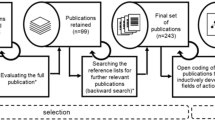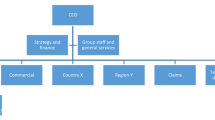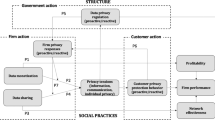
Overview
- Illuminates diverse facets of the intersection of technology and business ethics
- Helps in improving our understanding of the ethical implications of technology
- Shows what technology studies offers to the field of business ethics
Access this book
Tax calculation will be finalised at checkout
Other ways to access
About this book
This book focuses on how firms should engage ethical choices in develo** and deploying digital technologies. Digital technologies are devices that rely on rapidly accelerating digital sensing, storage, and transmission capabilities to intervene in human processes. While the ethics of technology is analyzed across disciplines from science and technology studies (STS), engineering, computer science, critical management studies, and law, less attention is paid to the role that firms and managers play in the design, development, and dissemination of technology across communities and within their firm. This book covers the topic from three angles. First, it illuminates diverse facets of the intersection of technology and business ethics. Second, it uses themes to explore what business ethics offers to the study of technology and, third, what technology studies offers to the field of business ethics. Each field brings expertise that, together, improves our understanding of the ethical implications of technology.
Chapter “A Micro-ethnographic Study of Big Data-Based Innovation in the Financial Services Sector: Governance, Ethics and Organisational Practices", chapter ”The Challenges of Algorithm-Based HR Decision-Making for Personal Integrity" and chapter “Female CEOs and Core Earnings Quality: New Evidence on the Ethics Versus Risk-Aversion Puzzle" are available open access under a Creative Commons Attribution 4.0 International license via springer.longhoe.net.
Similar content being viewed by others
Keywords
Table of contents (15 chapters)
-
Front Matter
Editors and Affiliations
About the editors
In 2012, Martin was named to the Census Bureau’s newly formed National Advisory Committee on Racial, Ethnic and Other Populations. The committee advises the Census Bureau on “topics such as housing, children, youth, poverty, privacy, race and ethnicity, as well as lesbian, gay, bisexual, transgender and other populations.” [3]
Martin is the research and business ethics editor for the Journal of Business Ethics and the recipient of three National Science Foundation grants for her work on privacy, technology, and ethics. She earned her bachelor’s degree in engineering from the University of Michigan and her MBA and Ph.D. in business from the University of Virginia.
Katie Shilton is an associate professor in the College of Information Studies at the University of Maryland, College Park, and leads the Ethics & Values in Design (EViD) Lab. Her research explores ethics and policy for the design of information technologies. She is the PI of the PERVADE project, a multi-campus collaboration focused on big data research ethics. Other projects include develo** privacy-sensitive search for email collections; analyzing ethical cultures in computer security research; and building tools to facilitate ethics discussions in mobile application development.
Jeffery Smith is Seattle University's Frank Shrontz Chair in Professional Ethics and Professor of Management in the Albers School of Business and Economics where he teaches ethics in the management, finance and accounting programs. Professor Smith's research interests lie at the intersection of philosophy and business, currently focusing on ethical decision making in organizations and the philosophical foundations of corporate social responsibility. Smith's work has been published in journals such as Business Ethics Quarterly, the Journal of Business Ethics and Ethical Theory and Moral Practice. He is also the co-author of the nationally recognized textbook Ethics and the Conduct of Business. Professor Smith is past President of the Society for Business Ethics and has held visiting appointments at Tilburg University in the Netherlands, the Janet Prindle Institute for Ethics and the Keck Graduate Institute. Professor Smith received his Ph.D. from the University of Minnesota.
Bibliographic Information
Book Title: Business and the Ethical Implications of Technology
Editors: Kirsten Martin, Katie Shilton, Jeffery Smith
DOI: https://doi.org/10.1007/978-3-031-18794-0
Publisher: Springer Cham
eBook Packages: Religion and Philosophy, Philosophy and Religion (R0)
Copyright Information: The Editor(s) (if applicable) and The Author(s), under exclusive license to Springer Nature Switzerland AG 2022
Hardcover ISBN: 978-3-031-18793-3Published: 10 November 2022
Softcover ISBN: 978-3-031-18796-4Published: 11 November 2023
eBook ISBN: 978-3-031-18794-0Published: 09 November 2022
Edition Number: 1
Number of Pages: VI, 302
Number of Illustrations: 15 b/w illustrations
Topics: Business Ethics, Philosophy of Technology, Artificial Intelligence



